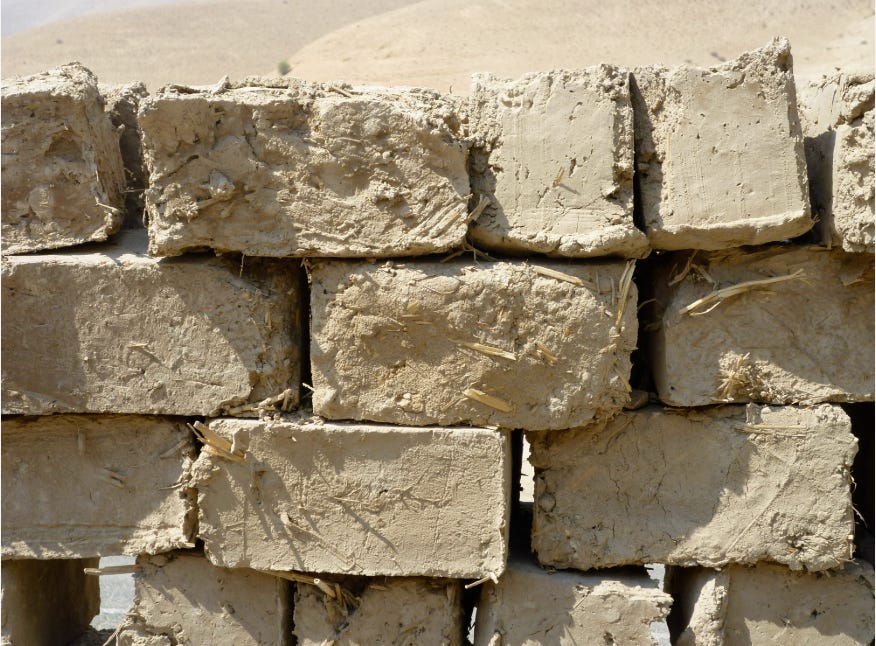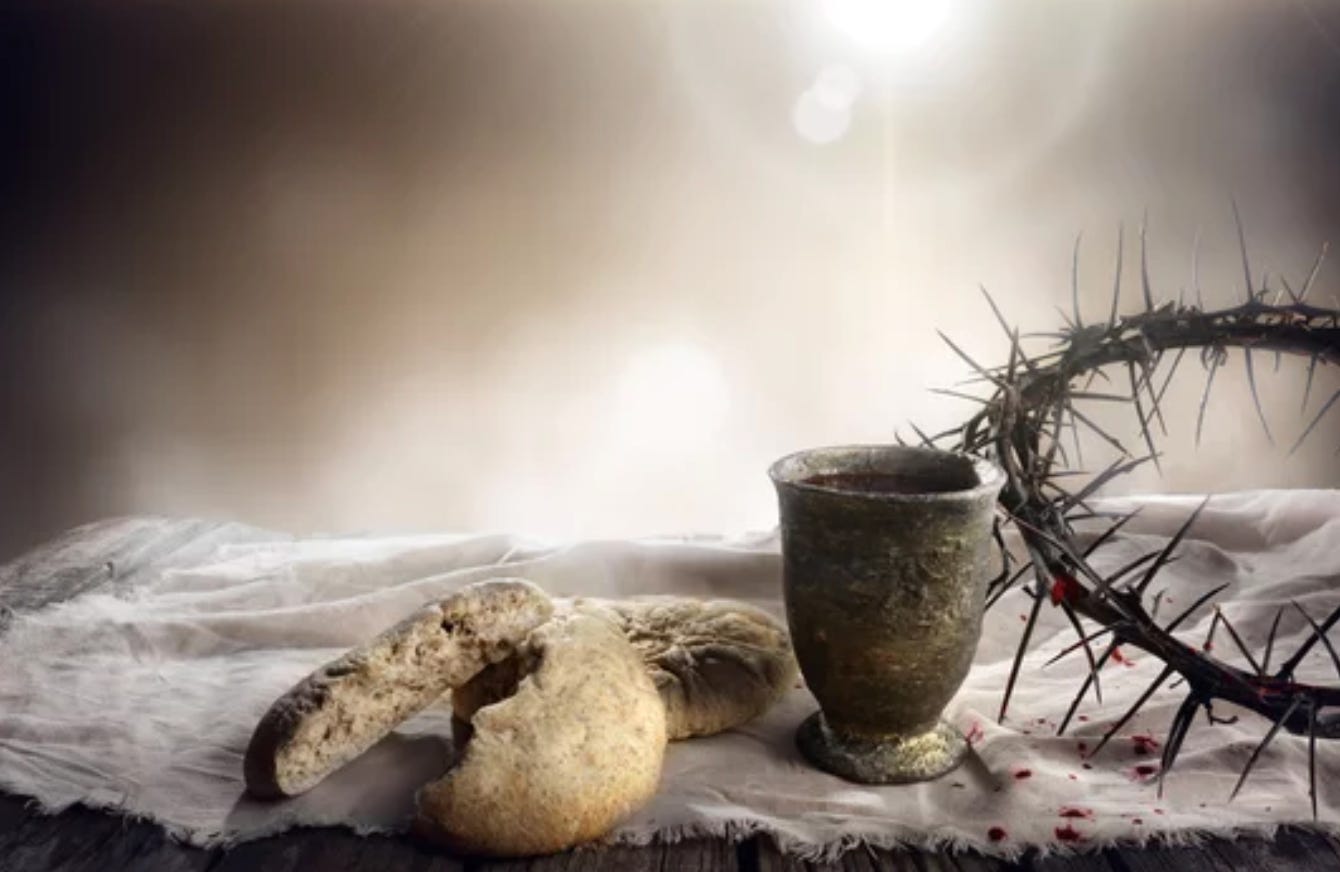The Melody Your Weary Soul Can't Afford to Miss
Jesus' Final Harmony for the Spiritually Depleted (Matthew 26:30)
The crack of the Egyptian whip split the air. The overseer's hands trembled as he surveyed the meager piles of stubble his fellow Israelites had gathered since dawn. His back still stung from the beating he received when yesterday's quota fell short. Pharaoh's impossible command changed everything: gather straw yourself, yet deliver the same number of bricks.
Have you ever faced demands that seem designed to break you?
Pharaoh's deliberate breaking of the human spirit in the Exodus story drove Israel to cry out to their God for relief. "God heard their groaning and remembered his covenant with Abraham, with Isaac and with Jacob" (Exodus 2:23-24, NIV).
The brick-makers couldn't have known then how their cries set in motion the most remarkable rescue story of the ancient world. The same story would one day be on the lips of a Jewish teacher at his final meal, hours before his execution.
Last Supper, Last Song
"When they had sung a hymn, they went out to the Mount of Olives" (Matthew 26:30, NIV).
This simple line in Scripture offers us a glimpse of a remarkable moment that occurred while Jesus shared the Passover meal with His disciples. On the night of His betrayal, just hours before His suffering began, Jesus broke bread, lifted the cup, and then—He raised His voice in song.
What was this hymn?
According to Jewish tradition, it would likely have been the Hallel Psalms (Psalms 113-118). Those gathered would have sung the first part (Psalms 113-114) before the meal and the final portion (Psalms 115-118) afterward, before they departed.
As Jesus sang these ancient words celebrating God's character and Israel's deliverance from bondage, He stood at the threshold of delivering an even greater exodus from slavery. The Creator God in human form, who spoke the cosmos into existence, used that same voice to sing psalms of deliverance before willingly accepting torture and death.
These melodies represent Maundy Thursday's forgotten music—songs that speak directly to our modern burnout. In these melodies of deliverance, we discover the God who hears when we've reached our breaking point, run out of resources, and can no longer deliver what our taskmasters demand.
To understand the magnitude of what Jesus sang and why these particular psalms would resonate with those in the upper room, we must return to the story they tell. We must return to Egypt, to a people making bricks with ever-diminishing resources, and to the God who heard their cries.
The Story Behind the Songs
God sent Moses as a deliverer after the Israelites endured 400 years in Egypt. Jacob’s family of 70 fled famine and prospered under Joseph’s protection as Pharaoh’s second-in-command (Genesis 41:43). But everything changed when a new Pharaoh “who did not know Joseph” (Exodus 1:8) intensified their oppression, reducing them to harsh slavery. God began fulfilling His ancient promise to make Abraham’s descendants into a great nation through an unlikely desert shepherd with a speech impediment. (Genesis 12:2)
“And now the cry of the Israelites has reached me, and I have seen the way the Egyptians are oppressing them. So now, go. I am sending you to Pharaoh to bring my people the Israelites out of Egypt” (Exodus 3:9-10, NIV ).
When Moses first confronted Pharaoh, demanding Israel's freedom, the tyrant didn't relent, he retaliated: "You are no longer to supply the people with straw for making bricks; let them go and gather their own straw. But require them to make the same number of bricks as before; don’t reduce the quota. They are lazy; that is why they are crying out, ‘Let us go and sacrifice to our God.’" (Exodus 5:7-8, NIV).
The deliberate crushing of their spirit pushed the Israelites beyond the breaking point. One of their overseers said to Moses and Aaron: "May the Lord look on you and judge you! You have made us obnoxious to Pharaoh and his officials and have put a sword in their hand to kill us" (Exodus 5:21, NIV).
Without the necessary straw, the Israelites had to gather stubble while still producing the same quota of bricks. It was a deliberate tactic to convince the Israelites that calling upon their God only made things worse.
What appeared as inevitable defeat became, instead, a prelude to deliverance. The Israelites' desperate situation led to a dramatic showdown between Yahweh and the false gods of Egypt. God challenged the hardened heart of Pharaoh one plague at a time, culminating in the night of Passover—when death passed over Israelite homes whose doorways were marked with the blood of a spotless lamb sparing their first born sons. Israel walked out of slavery with Egypt's wealth in their hands, crossing on dry ground as God parted the Red Sea. Moments later, those same waters closed over their Egyptian pursuers.
The Melody of Remembrance
The Hallel was Israel's theology set to music, their collective memory preserved in melody. As Jesus sang, multiple layers of meaning would have resonated in that upper room; words about defeating idols, delivering from the law of sin and death, and transforming rejection into redemption.
When Jesus sang on the night before His death, His voice carried both history and prophecy. The ancient lyrics of deliverance transformed as they passed through his lips—commemoration crystallizing into fulfillment before the disciples' unseeing eyes.
In Psalm 115-118 we see:
God is not a lifeless idol. "Their idols are silver and gold, the work of human hands. They have mouths, but do not speak; eyes, but do not see." (Psalm 115, ESV)
God hears and delivers."I love the LORD, because he has heard my voice and my pleas for mercy... For you have delivered my soul from death, my eyes from tears, my feet from stumbling." (Psalm 116, ESV)
God is worthy of global praise."Praise the LORD, all nations! Extol him, all peoples!" (Psalm 117, ESV)
God’s cornerstone, would be rejected."The stone that the builders rejected has become the cornerstone. This is the LORD's doing; it is marvelous in our eyes." (Psalm 118, ESV) Jesus would later quote Psalm 118 about Himself, declaring its fulfillment as He was rejected by Israel’s leaders (Mark 12:10).
Did Jesus contemplate how each verse was about to find its fulfillment in the hours ahead?
The parallels between the first exodus and the one Jesus was about to lead are stunning.
Oppression under a tyrant.
First Exodus: Pharaoh burdened the Israelites with forced labor and impossible demands, including making bricks without straw (Exodus 1:11–14; 5:6–18).
Jesus: Humanity lives in bondage to sin, carrying burdens it cannot escape or resolve on its own (John 8:34; Romans 6:6).
A deliverer is sent by God.
First Exodus: God called Moses to confront Pharaoh and lead His people out of slavery (Exodus 3:10; 6:13).
Jesus: God sent His Son to deliver people from sin and death and to lead them into eternal life (John 3:16–17; Luke 4:18–19).
A lamb is slain to preserve life.
First Exodus: Each household slaughtered a lamb without blemish and marked their doorframes with its blood. Those who obeyed were spared the death of their firstborn sons (Exodus 12:3–13).
Jesus: Jesus became the Lamb of God, whose blood covers and redeems those who trust in Him (John 1:29; 1 Peter 1:18–19).
A meal of remembrance is instituted.
First Exodus: The Passover meal was established as a memorial of God’s deliverance—a meal to remember their rescue by God’s hand (Exodus 12:14–17).
Jesus: Jesus transformed the Passover meal into communion, offering His body and blood as the new covenant of deliverance (Luke 22:19–20; 1 Corinthians 11:23–26).
God breaks the power of the oppressor.
First Exodus: God crushed Pharaoh’s resistance through plagues and broke Egypt’s hold on Israel (Exodus 12:29–33).
Jesus: Jesus disarmed the powers of sin, death, and the devil through the cross and resurrection (Colossians 2:14–15; Hebrews 2:14).
God makes a way through impossible waters.
First Exodus: God parted the Red Sea and led His people through it on dry ground, delivering them while drowning their enemies (Exodus 14:21–28).
Jesus: Jesus opened the way to life through His death and resurrection, making a path no one else could forge (John 14:6; Hebrews 10:19–20).
As Jesus transformed the Passover meal into what we now call communion, declaring "this is my body" and "this is my blood," He was revealing Himself as both the new Moses leading a greater exodus and the Passover lamb making that exodus possible.
What Jesus would accomplish through His death addressed the impossible problem of humanity—separation from God through sin. While Pharaoh's impossible brick quotas crushed Israel physically, this spiritual separation from God was a burden no human effort could overcome. Where the blood of a Passover lamb once protected Israel’s first born sons from physical death, now the blood of the spotless Lamb of God would address our deepest need: forgiveness of sins and reconciliation with God.
Making Bricks Without Straw Today
What does an ancient story of liberation—sung about by Jesus on His final night—have to do with us today?
Perhaps more than we often remember on any given day.
We still live in a world of pharaohs that demand we make bricks without providing the straw we need to do so. Like the ancient Israelites, we often find ourselves scattered across metaphorical fields, desperately gathering stubble to meet impossible quotas. We soon discover there is not enough straw in the world to meet our deepest need.
Like the ancient Israelites, our brick-making often serves false gods—building monuments to powers that promise salvation but deliver only bondage.
Timothy Keller defines these idols as “anything that absorbs your heart and imagination more than God, anything you seek to give you what only God can give.” (Timothy Keller, Counterfeit Gods)1
Our hearts remain remarkably efficient brick factories, constantly constructing monuments to gods that cannot save:
We exhaust ourselves building careers that promise fulfillment but leave us empty.
We craft perfect social media personas while our real selves crumble.
We pursue financial security that can vanish overnight.
We seek validation from relationships that cannot bear the weight of our expectations.
We even turn religion itself into a performance that earns God's favor.
Each of these represents bricks we make for modern pharaohs—systems that demand everything while providing nothing of eternal value. Like the Israelites, sometimes the greatest grace comes in the breaking—when we've run out of our own resources and finally cry out from the depths of our weariness from trying.
Feasting on Forgiveness
Our first communion with Christ happens when we trust His finished work on the cross for forgiveness of sins. Sin brought spiritual death, and the dead cannot save themselves. Only God Himself, through Christ's perfect sacrifice, could bridge the infinite gap between humanity and our Creator. This feast of forgiveness flows from God's boundless love and justice perfectly satisfied.
The meal that brought us from death to life is the meal that sustains us daily. When we participate in communion, we are joining a new song of freedom—a melody that connects the first exodus with the ultimate one. "Do this in remembrance of me" (Luke 22:19, NIV) becomes our Hallel—our song of praise for liberation not just from political powers like the Israelites did in Egypt, but from the pharaohs of our hearts.
Yet, like the Israelites who, after walking through walls of water held back by God's mighty hand, soon groaned for Egypt's predictable comforts: 'If only we had died by the LORD's hand in Egypt! There we sat around pots of meat and ate all the food we wanted' (Exodus 16:3, NIV). How quickly they preferred slavery’s certainty over freedom’s uncertainty.
This painful irony plays out in our own lives when, after experiencing God's gracious deliverance, we return to making bricks for the very pharaohs Christ freed us from. We trade heaven's provision for familiar chains, forgetting that difficult freedom surpasses comfortable slavery.
As we approach the cross this Holy Week, may we hear in Jesus' final song an invitation to join a new exodus—to pass through the waters, walk away from bondage and follow the One who sang of deliverance even as He walked toward sacrifice.
We can’t afford to miss this melody meant for weary souls—the soundtrack of a God who hears our groaning and transforms our impossible burdens into pathways to freedom.
Let the melody of Maundy Thursday invite you to examine your heart and:
identify the false gods for whom you still exhaust yourself making bricks.
learn to cry out honestly from the depths of your impossible situations, just as the Israelites did.
allow your breaking points to become breakthroughs, where impossible demands drive you to the God of impossible deliverance.
"Are you tired? Worn out? Burned out on religion? Come to me. Get away with me and you'll recover your life. I'll show you how to take a real rest. Walk with me and work with me—watch how I do it. Learn the unforced rhythms of grace. I won't lay anything heavy or ill-fitting on you. Keep company with me and you'll learn to live freely and lightly." (Matthew 11:28-30, MSG)
Easter season invites us to step away from our brick-making, to lay down our stubble-gathering tools, and come to Jesus. In His presence, we recover our lives and learn the unforced melody of grace—the very song Jesus sang before He died to set us free.
Thank you for supporting Shifts Happen. Every time you read, like, comment, or share, it not only encourages me to keep writing—it helps others discover this space too. I’m so grateful you’re here.
Disclosure: As an Amazon Associate, I earn from qualifying purchases. This post may contain affiliate links, which means I may receive a small commission at no additional cost to you if you make a purchase through these links. Thank you for supporting this ministry.











